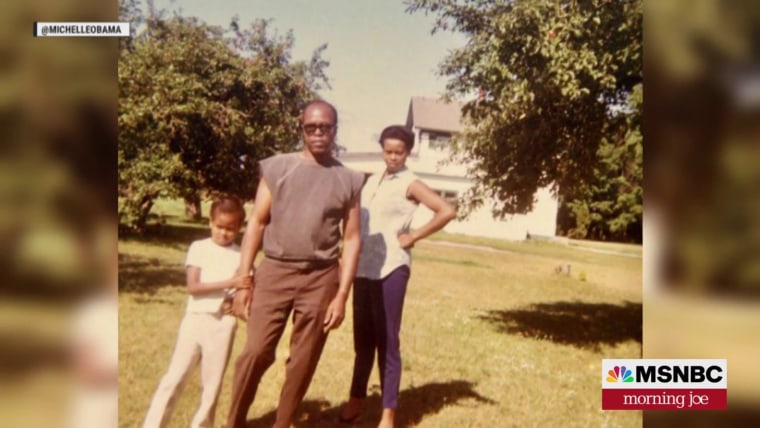Last week’s installment of “IMO,” the podcast Michelle Obama hosts with her brother, Craig Robinson, was called “What Losing Our Mother Taught Us About Love, Life, and Family.” Marian Robinson, who lived in the White House with the Obamas for eight years, died May 31 last year, and the siblings talked about what a major shift it is even for people in their 60s to lose a parent. Their father died of multiple sclerosis 34 years ago, and, for Obama, losing the woman who had been her lifelong rock — especially during the stressful White House years — left her facing the reality that she’s “next up.”
You don’t really become an adult until your parents are gone.
michelle obama
In a previous appearance on Jay Shetty’s “On Purpose” podcast, Obama revealed that she’s in therapy to figure out what her life means outside of the constraints of traditional family roles and, in part, to “talk about how my relationship with my mother has affected how I think about things.”
“You don’t really become an adult until your parents are gone,” she said on last week’s podcast with her brother. “When your parents are not in that spot of managing and maintaining, we become the parent, we become the convener, we become the glue.”
And by “we,” she means women, who are expected to broaden, not reduce, their mothering role as they age. They become Madea, Big Mama, Ma’dear, the family center who keeps the traditions, makes holiday magic, cares for the family’s newest members and sets family expectations. Aging, exhausted mothers never retire. If they live long enough, they become matriarchs.
Last week, I went to my backyard shed to prepare for my Mother’s Day gardening. As I rifled through my stash of spades, gloves and tomato cages, I saw a dusty cardboard crate with my handwriting on the side: “Grandma’s dishes.”
In the 1960s, my mother, then a military wife living in Japan, bought the set of Noritake bone china for her mother. To my knowledge, my grandmother — a country woman whose kitchen cabinets held Corningware and enamel pots — never used the delicate plates with the lacy blue pattern. And although the dishes sat in our dining room cabinet for decades after my grandmother died, I never knew my mother to even take a sip from one of the thin teacups.
During a decluttering frenzy years ago, I’d stored the china in the shed. “Why am I holding on to this?” I mumbled to myself.

Maybe it’s because the china, vintage and unused, represents the dreams my foremothers never realized. How desperately they longed to be accepted and worthy of something that fancy!
But the plates also represented the miracle of a young, Black couple from the Jim Crow South raising a child overseas. How do I let go of the graceful bowls that held their dreams? What parts of my mother should I allow to slide into the past, and which parts should I preserve for the future?
The dictionary definition of matriarch, “a mother who is the ruler of her family and descendants,” implies royal power, firm control and undisputed leadership. But I daresay many women assume the matriarch title reluctantly, and with a healthy dose of passive aggression. They wake up one day and find themselves the keeper of the family flame simply because no one else will keep it.
If Obama doesn’t want to become her tribe’s connective tissue, then she may also need to use her time in therapy to define what it means to be a matriarch.
Apparently, Obama isn’t having it. During the podcast, she reminded her brother that she’s the younger sibling — and younger than her husband, the former president.
“I’m not next up,” she joked with Robinson. “I delegate that power to you. I’m not really ready.”
Who can blame her? It’s a cruel twist to tell a woman she needs to become the top trad-gran after she’s already dedicated the lion’s share of her life to her family. If Obama doesn’t want to become her tribe’s connective tissue, then she may also need to use her time in therapy to define what it means to be a matriarch. It definitely shouldn’t mean being everything to everyone until you’re in the grave.
“After all that I’ve done in this world,” she told her brother and “IMO” guest Taraji Henson in April, “if I am showing [my daughters] that … I still have to show people that I love my country, that I’m doing the right thing, that I am … going high all the time — even in the face of a lot of hypocrisy and contradiction — all I’m doing is keeping that crazy bar that our mothers and grandmothers set for us.”

Last Mother’s Day weekend, we said goodbye to my mother, my dearest friend. In the disorienting months since, my grief has been drowned out by the Call of the Matriarch howling at my door. I became the repository of three generations of Christmas ornaments, two generations of recipes, nearly five generations of family history and the manager of a four-generation family home.
It’s taken me a while to test the boundaries of my own matriarchal powers. Slowly, I dared to cancel some holidays and downgrade others. (This Easter, for example, there was no big family meal, no new outfits, no backyard Easter egg hunt.) Not everyone who visits my home is entitled to a meal, although everyone is free to eat whatever’s in the fridge. I thank God for social media, which helps me maintain family connections, because I’m never writing greeting cards or sending thank-you notes again. It’s hard enough to squeeze in a call. Housework and meal prep are now team sports. I prioritize my passions and expect others to shape themselves around me. And my new (self) love language can be summarized in one word: “No.”
My new (self) love language can be summarized in one word: “No.”
As this Mother’s Day approached, I found myself filled with teary gratitude for all that my mother sacrificed for me. I’m looking for new ways to honor her. Because she rarely could, I’ll stake out “me time” in the garden. Then I’ll nap or read or both. I hope Obama will find meaning for herself this Mother’s Day, too.
And as the new family matriarch, I’ll take a sip from one of those pristine teacups and then place the dishes on OfferUp. Yes, dear Mother, we’ve always been worthy of the best.
